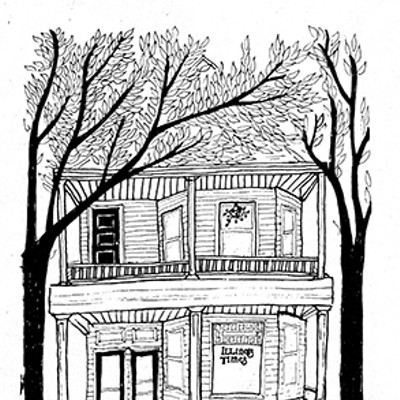A while back – a long while back – I undertook to write a smallish book about a large topic, the history and culture of Illinois. I was certain that after more than 30 years spent reading, thinking and writing about Illinois in most of its aspects, it was a job I could do in my sleep. I began work about when the lesser George Bush began his first term in the White House and finished it, mostly, about the time he got on the bus back to Crawford, neither of us having achieved what he tried to do during those eight years.
You’ve heard about the man who knew too much? I have met him, and I can tell you that his name is James Krohe Jr. My aim was to produce a manuscript that contained no more than twice the words found in an average Michelin Guide. I quickly began piling up words as fast as some of my home-owning neighbors were then piling up borrowed dollars.
I should have seen it coming. White and Strunk’s Elements of Style, which urges conciseness and brevity, made as little sense to me as, say, Grover Norquist on taxes. As a result, I have spent 35 years trying to cram magazine articles into the space of a newspaper column, and book chapters into the space of a magazine article, and haven’t pulled it off yet.
I might have been cured as a young professional had I gone to work for, say, a daily newspaper where reporters are typically given only 250 words to tell 500 words worth of story. Instead, like many a bright young boy from small-town Illinois who goes to Chicago, I met people all too willing to indulge my weaknesses for their own profit. I found them not in the drug dens of the West Side but in a converted warehouse in River North, at the offices of the Reader, Chicago’s alternative weekly.
I was to write nearly 60 pieces for that weekly, several of which were some 10,000 words long. By Reader standards, this verged on the laconic. The Reader of yore was a refuge for the endangered species known as long-form journalism. Ben Joravsky’s two-part report in 1992 on the Roosevelt High basketball program, for instance, added up to 40,000 words. This put the editors at odds with much of their readership, which cherished the paper mainly for its entertainment reviews and classified ads. One of the veteran editors, Michael Miner, recently offered this imaginary riposte to those who complained that even a commute on Chicago’s slow-poke el gave them too little time to finish a Reader cover story. “We’re publishing 20,000 words on beekeeping because Mike Lenehan felt like writing 20,000 words, and we know you won’t read 19,000 of them; but if you do, by God, you won’t find a single typo or dangling participle and you’ll learn a hell of a lot about bees. And if you don’t, no hard feelings and good luck finding that apartment.”
I passed 20,000 gaining speed. The years rolled by, measured in paragraphs rather than minutes. I didn’t keep a running word count, for the same reason that many of the people who work in midtown New York don’t look at the dollar count displayed on the National Debt Clock on Sixth Avenue; the relentless growth in the number only depresses them, and there was nothing they could do to stop it.
I was quite aware that I was approaching the limits both to readers’ time and patience and to publishers’ budgets. (I gave a section to a friend to read; he said, “It really is more than anyone would want to know, isn’t it.”) Finally, my curiosity got the better of my judgment. I toted up the words, not daring to peek at the running total on the screen of my calculator until I had punched in the last number. The total popped onto the screen: 679,872.
I couldn’t stop laughing. The absurdity of it was extravagant, the extravagance absurd. A 300-page book runs about 150,000 words. One of 680,000 words would be three times longer than Crime and Punishment, six times longer than Huckleberry Finn, more than nine times longer than Catcher in the Rye, 850 times longer than this column and 30,565 times longer than a Tweet.
In my defense, I point out to the incredulous that, yes, the authors of the Christian Bible needed 775,000 words to tell their stories, but they only had to describe the creation of the world, the history of the Jewish people and the career of their savior, while I had to make Illinois sound interesting. I mean, maybe you could get it down to 600,000 if you left out Peoria, but then what do you do for laughs?
Contact James Krohe Jr. at [email protected].






















